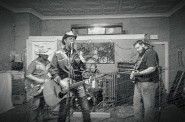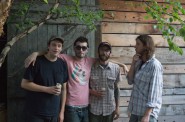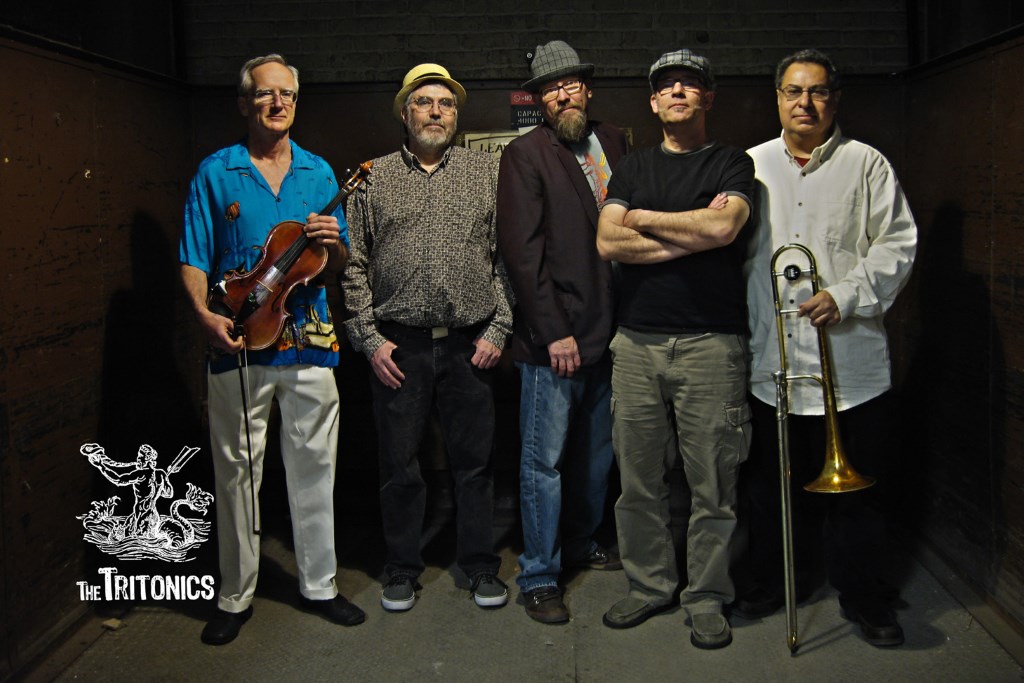The Tritonics Play Reggae, Have Fun
The music's pretty mellow. Not too loud. But you can dance.
Milwaukee band The Tritonics band casts a wide net for musical influence, but they find their core in rock-steady reggae. Comprised of long-time musicians Dave Bolyard, Jeff Stehr, Glen Asch, Dave Cusma and Tom Plutschack; The Tritonics have a unique sound that blows in like an island breeze.
Urban Milwaukee sat down with Stehr and Bolyard to get a better sense of what keeps The Tritonics sailing.
How did you get started?
Stehr: The original trio was a band called C Food Buffet. That was Dave Bolyard, Tom Plutchak and myself. We were a band for five years in the 90’s and we dabbled in a lot of styles. Then we all got involved in different projects, went in different directions. Roughly five years ago, a person I work with had a party and wanted a band to play. So, I contacted these guys to do a private party gig, we hadn’t played for a while, and it ended up turning into a real band.
Bolyard: First he said ‘oh yeah I know a reggae band’, he didn’t tell her it was a reggae band that hadn’t played together for 10 years.
Stehr: I just called these guys up and I’m like ‘we need to get like 30 songs together in two weeks, can you pull that off?’, and it ended up working out great.
Any particular artist that inspired you to start playing?
Bolyard: That’s a pretty diverse group.
Stehr: Yeah we listen to everything.
Bolyard: The Police would be one.
Stehr: Yeah, The Police and the English Beat and XTC. If people came and saw us they would reference them, and those are definitely all our influences. I’m not sure if we were consciously trying to emulate anybody. If you asked anybody in the band if we dig those bands we’d all be on board.
Bolyard: We had a way more focused approach when we got together this second time. Now we’re strictly doing rock steady reggae, which is pre-Marley.
Stehr: Before (Bob)Marley blew up, most of the bands were playing Ska and rock steady music. Reggae was happening too, but It was Marley that made it kind of a worldwide phenomenon. We were a pretty stripped down group, so we kind of consciously chose those root styles of Jamaican music.
Instruments?
Stehr: Dave Cusma on Trombone. Glen Asch on Viola. Tom Plutschack on guitar and sings. Dave Bolyard on drums and sings. I sing, play keyboards and play the bass parts on the keyboards.
Bolyard: And I play a little trumpet too.
Where does the name come from?
Stehr: Well C Food Buffet was our original name.
Bolyard: It was kind of a play on the aquatic theme.
Stehr: Reggae being kind of island music, and Triton being the god of the sea we thought we’d continue the aquatic thing.
Bolyard: He’s got a conch horn too. A lot of the rock-steady music has horns.
Stehr: Of course tri means three, and we started out as a trio. Tonic is the home key in music. Then there’s the tri-tone.
Bolyard: Right, the devils interval.
Stehr: Ya know, because were not really edgy. We’re just kind of boring guys, so we have the tri-tone in there to seem edgier; If you’re a music geek, I don’t think most people would see that otherwise.
How old are you guys?
Stehr: I have a favorite answer to that question. One of the songs we do is Toots and the Maytals’ “54-46”. Basically that’s our demographic, as well as the age of the band: 54-46.
How would you describe your music?
Bolyard: It’s like a lilting reggae, but it doesn’t have the bombastic-ness of reggae. We’re pretty on the mellow. We don’t play real loud. Most of the stuff is in medium tempo.
Stehr: I’ve heard people say it’s an update of the rock-steady sound. We definitely love all that original music, but we don’t approach it like a tribute band. People dance, it’s not so chill that people don’t dance. I agree with Dave, I think the best way to describe it is really a lack of bombast. It’s more intimate sounding.
Any local artists you guys really like?
Stehr: Yeah there’s a lot. Max & the Invaders are a fabulous local ska band who we love and have helped us out numerous times over the years.
Bolyard: People like Willy Porter and Peter Mulvey. Even though they don’t do anything close to what we do in terms of style, they’re fantastic musicians. Paul Cebar.
Stehr: He’s playing with R&B Cadets, which was his original band. The guy who is co-producing our new record is John Sieger. Paul Cebar and John played together in the Cadets. Dave and I just saw living dub at Club Nomad led by David Wake, who is the keyboard player in De La Buena and Aluar Pearls, they’re great.
What do you think of the Milwaukee music scene?
Bolyard: We’re old so..
Stehr: 54-46.
Bolyard: It seemed like when they changed the drinking age, it was 18 and they changed it to 21, that it really affected the club scene a lot. The clubs seemed like they really scaled back.
Stehr: The younger people wouldn’t even notice that, because the drinking age was over 18 when we started playing in bands. So you had everyone in college, basically from their freshman year on, they were out at the bars drinking and going to see live music. Now three of those years are gone. What’s great though is that the city itself seems to be undergoing a renaissance, and that includes music. Even though it has probably never been harder to find steady paying gigs that actually pay musicians a reasonable wage for what they d0, the number of musicians here and the quality of music that’s produced; I don’t think its ever been better. There’s just blossoming great music everywhere.
Bolyard: Then there’s the 88Nine local live thing they got going. They’ve been a big booster or the local scene.
Stehr: You’ve got the three big radio players that all help the local music scene. WUWM, WMSE and 88Nine. Without them we’d all have a much harder time getting the word out about where we’re playing.
Bolyard: The people at WMSE have been very supportive of us, since we re-formed and started doing this.
You were playing pre-internet, and in the internet age. How have things changed?
Bolyard: Well, the marketing is all online. All the posters I make now just go online or in emails.
Stehr: You don’t see all the flyers stapled up to the telephone poles on Brady street anymore. The cool thing is, cost-wise you can get the word out pretty cheaply. Basically for the cost of an internet connection. Then also, there is way more noise. We’re just one little pebble and there’s all these different bands vying for attention on the same page.
Bollard: I still make posters sometimes to schlep up at The Fuel.
Where do you play most often?
Bolyard: Probably at Circle-A. That’s our favorite club.
Stehr: It is. It’s tiny, and holds probably 60 people at the most. Almost everyone in the band either lives in, has lived in or is constantly around River West. So, all the stuff in there such as Linnemans, Public House. I love Circle-A because there’s no stage. If you come to see the show, chances are you’re gonna be standing right next to my shoulder. The only person that’s safe is Dave behind the drum-kit. We’ve had drunk people and semi-clothed people dancing all around us.
Dave: Yeah, the drum kit is not always a fail-safe blockade.
Jeff: Another one is the Milwaukee boat line. We do it every summer. We go out on the lake and play for two hours. We’re not a terribly big band, but we always sell out that gig.
Dave: I think it’s called the Milwaukee boatline concert cruise. They run it all summer.
Have you ever toured?
Bolyard: We do like mini-tours. We’ve gone to San Fransisco for the last five years.
Stehr: Yeah we leave two-weeks from today, actually. Someone we know hires us to play at Stanford University every year. So, that’s kind of the anchor gig. Before we went out there for the first time, we reached out to a lot of local musicians we found online. Now, we have all these friends so we play in Mission District and we play in Berkeley. It’s kind of like a one-week tour.
Bolyard: We stay pretty local, because Glen works for the symphony and our trombone player is a math teacher.
Jeff: Yeah, so tours are short. Never more than a week in a row.
You have an album coming out?
Stehr: Yeah, it’s in the mastering stage right now. Probably a max of two-weeks until that’s done. Then it will take a week to produce it, so it will be out in December.
Bolyard: Billy Ciccarelli from WMSE is mastering the recordings for us.
Stehr: It’s called Dance Crasher, which is also the title of a famous rock steady song. During the Bay View Bash a few years ago we hired a friend of ours, Shane Engleking, to take pictures. When we looked through the pictures at the end of the night there was this older gentleman in this elaborate suit with all kinds of jewelry and this Tiparillo cigarette, and he was dancing. Not just casually dancing, like seriously dancing. So, years later we found this guy. We basically crowdsourced the pictures asking if anybody knew him. He’s gonna be on the cover of the record, and he’s gonna be at the CD release party. His name is Chuck Wage, and he’s a wonderful dancer and a really neat guy. But he’s older, like far older than us.
Bolyard: Think like vintage leisure suits. That’s what he wears.
Stehr: That was a really long answer; its called Dance Crasher. The record will come out in December, then on January 29 were having the release party at Linnemans.
Plans for the future?
Bolyard: Just keep going.
Stehr: We’ve talked about the next record already. We talked about making it a live record. A friend of ours is in Dr. Chow’s Love Medicine and he does sound for us, Joe Polizzi he’s a really good sound engineer.
Cascio Interstate Music is proud to sponsor Urban Milwaukee�s Band of the Week column. Running in tandem with their own Band of the Month program, supporting local music is key to CIM�s mission.Band of the Week
-
Johnson Opposes Ventilators, Pushes Horse Medicine
 Aug 23rd, 2021 by Bruce Murphy
Aug 23rd, 2021 by Bruce Murphy
-
David Clarke Is Still Crazy
 Mar 16th, 2020 by Bruce Murphy
Mar 16th, 2020 by Bruce Murphy
-
Yo-Dot Could Be Big Tomorrow
 Apr 3rd, 2017 by Mitchel Writt
Apr 3rd, 2017 by Mitchel Writt
Cascio
-
Liar’s Trial is Loud and Powerful
 Sep 21st, 2016 by Jeff Cook
Sep 21st, 2016 by Jeff Cook
-
Listening Party Demands Your Attention
 Aug 26th, 2016 by Jeff Cook
Aug 26th, 2016 by Jeff Cook
-
Will Ladders Climb To The Top?
 Aug 16th, 2016 by Jeff Cook
Aug 16th, 2016 by Jeff Cook






















